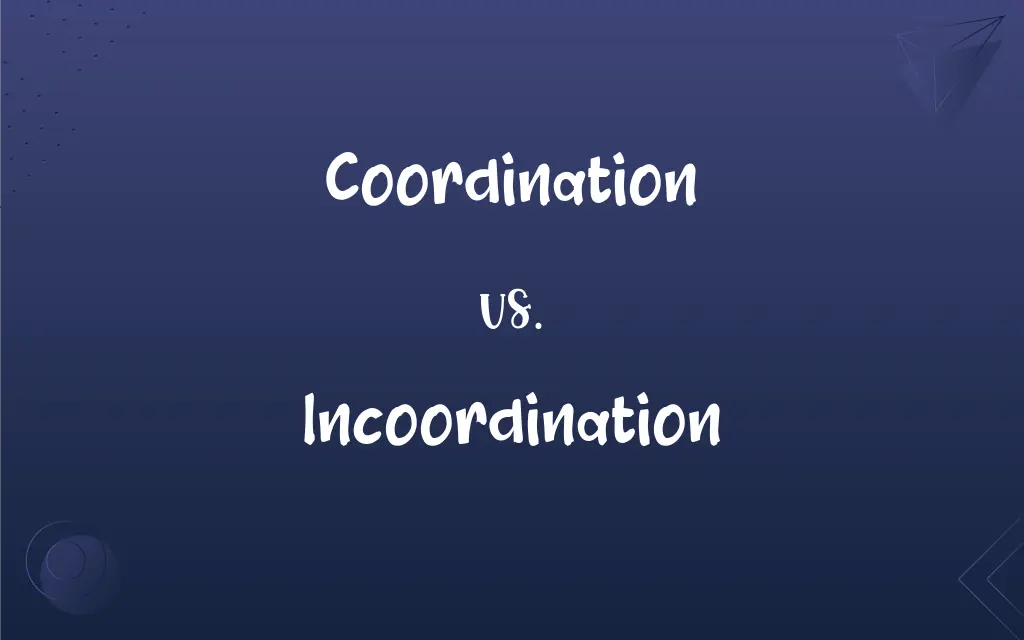Coordination vs. Incoordination: What's the Difference?
By Aimie Carlson & Harlon Moss || Updated on May 21, 2024
Coordination refers to the harmonious functioning of parts or processes, while incoordination denotes the lack of such harmony, resulting in disordered or inefficient action.

Key Differences
Coordination involves the smooth and efficient functioning of different body parts or processes working together seamlessly. It is essential for tasks that require precision and timing, such as playing a musical instrument or engaging in sports. Incoordination, on the other hand, signifies a disruption in this harmony, leading to clumsy or uncoordinated movements and actions.
In physical activities, coordination ensures that muscles and limbs work together fluidly, enabling complex motions and tasks. Athletes, for example, rely on high levels of coordination to perform optimally. Incoordination, however, disrupts this flow, causing movements to be jerky or unsteady, which can impede performance in physical tasks.
Coordination in neurological terms refers to the brain's ability to manage and direct body movements effectively. This involves precise timing and the integration of sensory information. Incoordination, in contrast, may result from neurological disorders where this control is impaired, leading to symptoms like tremors or unsteady gait.
In the context of teamwork, coordination refers to the organized effort of individuals working towards a common goal, ensuring efficiency and synergy. Incoordination within a team, however, can lead to misunderstandings, inefficiency, and a lack of progress due to misaligned efforts.
Coordination also applies to organizational management, where it ensures that different departments and functions align their activities towards the organization's objectives. Incoordination in this context can lead to duplicated efforts, wasted resources, and missed opportunities, hampering the overall effectiveness of the organization.
ADVERTISEMENT
Comparison Chart
Definition
Harmonious functioning of parts or processes
Lack of harmony in functioning or processes
Physical Activities
Smooth, fluid movements
Clumsy, jerky movements
Neurological Control
Effective brain management of body movements
Impaired control leading to unsteady actions
Teamwork
Organized, efficient collaboration
Misaligned, inefficient efforts
Organizational Management
Alignment of departmental activities
Duplicated efforts, wasted resources
ADVERTISEMENT
Coordination and Incoordination Definitions
Coordination
Harmonious integration of multiple parts or activities.
The gymnast's performance showcased perfect coordination.
Incoordination
Lack of harmonious integration, leading to disorder.
The patient's incoordination was evident in their unsteady walk.
Coordination
The synchronization of movements or efforts in a process.
Dance routines require precise coordination among dancers.
Incoordination
Disruption in the synchronization of movements or activities.
The incoordination of the orchestra resulted in a poor performance.
Coordination
The ability to move different parts of the body smoothly and efficiently.
Good hand-eye coordination is essential for playing tennis.
Incoordination
The inability to move body parts smoothly.
Incoordination can make simple tasks like buttoning a shirt difficult.
Coordination
Organizational management to ensure efficient workflow.
The project succeeded due to effective coordination between teams.
Incoordination
Disordered arrangement causing inefficiency.
Incoordination in logistics led to a mix-up in deliveries.
Coordination
The act of coordinating.
Incoordination
Inefficient or misaligned organizational efforts.
Incoordination between departments led to project delays.
Coordination
The arrangement of elements in a logical or efficient order.
Traffic coordination helps prevent congestion.
Incoordination
Lack of coordination, especially of normal voluntary and harmonious control of muscular movement.
Coordination
The state of being coordinate; harmonious adjustment or interaction.
Incoordination
Lack of coordination, especially in terms of muscle control.
Coordination
(Physiology) Harmonious functioning of muscles or groups of muscles in the execution of movements.
Incoordination
Lack of coördination; lack of harmonious adjustment or action.
Coordination
(Grammar) The linking of two syntactically equal units, as by a coordinate conjunction.
Incoordination
A lack of coordination of movements
Coordination
The act of coordinating, making different people or things work together for a goal or effect.
Coordination
The resulting state of working together; cooperation; synchronization.
Coordination
The ability to coordinate one's senses and physical movements in order to act skillfully.
I'm terrible at sports; I have no coordination.
Coordination
(possibly archaic) the state of being equal in rank or power.
Coordination
(grammar) An equal joining together of two or more phrases or clauses, for example, using and, or, or but.
Coordination
(chemistry) The reaction of one or more ligands with a metal ion to form a coordination compound.
Coordination
The act of coördinating; the act of putting in the same order, class, rank, dignity, etc.; as, the coördination of the executive, the legislative, and the judicial authority in forming a government; the act of regulating and combining so as to produce harmonious results; harmonious adjustment; as, a coördination of functions.
Coordination
The state of being coördinate, or of equal rank, dignity, power, etc.
In this high court of parliament, there is a rare coördination of power.
Coordination
The skillful and effective interaction of movements
Coordination
The regulation of diverse elements into an integrated and harmonious operation
Coordination
The grammatical relation of two constituents having the same grammatical form
FAQs
Can coordination be improved?
Yes, coordination can be improved through practice, training, and exercises designed to enhance motor skills and timing.
What is the role of coordination in teamwork?
Coordination in teamwork ensures that all members work efficiently towards a common goal, minimizing misunderstandings and duplicative efforts.
What is coordination?
Coordination refers to the smooth and efficient functioning of parts or processes working together harmoniously.
What causes incoordination?
Incoordination can be caused by neurological disorders, injuries, or lack of practice and training in specific tasks.
How does coordination affect athletic performance?
High levels of coordination enhance athletic performance by enabling fluid, precise, and controlled movements.
How does incoordination impact daily activities?
Incoordination can make daily activities challenging, as it leads to clumsy or unsteady movements, impacting tasks like walking or handling objects.
How does incoordination manifest in neurological disorders?
Incoordination in neurological disorders can manifest as tremors, unsteady gait, or difficulty performing fine motor tasks.
Why is coordination important in organizational management?
Coordination ensures that all departments and functions align their activities towards achieving the organization's objectives efficiently.
How does effective coordination benefit an organization?
It ensures efficient workflow, reduces waste, and aligns efforts towards common goals, enhancing overall productivity.
What are some examples of coordination exercises?
Examples include balance training, agility drills, and activities that require synchronized movements like dancing or playing sports.
What is the difference between coordination and balance?
Coordination refers to the harmonious functioning of parts, while balance is the ability to maintain stability and control over one's body position.
Is incoordination always related to a neurological issue?
Not always; it can also result from injuries, lack of practice, or certain medical conditions affecting muscle control.
Can poor coordination be a sign of a serious condition?
Yes, it can indicate underlying neurological issues and should be evaluated by a healthcare professional if persistent.
Can incoordination be treated?
Treatment depends on the cause but may include physical therapy, occupational therapy, and exercises to improve motor control.
What are the signs of poor coordination in children?
Signs include difficulty with tasks requiring fine motor skills, clumsiness, and challenges in sports or activities requiring precise movements.
How does incoordination affect learning and development in children?
It can impact a child's ability to perform tasks requiring fine motor skills, affecting their academic and social development.
Can incoordination improve with practice?
Yes, regular practice and targeted exercises can help improve coordination over time, even in individuals with incoordination issues.
What exercises can help improve hand-eye coordination?
Activities like playing catch, video games, and certain sports can enhance hand-eye coordination.
Why is coordination crucial in emergency response teams?
Coordination ensures that team members work efficiently and effectively under pressure, which is vital for successful emergency responses.
What are some common coordination tests used by doctors?
Tests include the finger-to-nose test, heel-to-shin test, and various balance and agility assessments.
About Author
Written by
Aimie CarlsonAimie Carlson, holding a master's degree in English literature, is a fervent English language enthusiast. She lends her writing talents to Difference Wiki, a prominent website that specializes in comparisons, offering readers insightful analyses that both captivate and inform.
Co-written by
Harlon MossHarlon is a seasoned quality moderator and accomplished content writer for Difference Wiki. An alumnus of the prestigious University of California, he earned his degree in Computer Science. Leveraging his academic background, Harlon brings a meticulous and informed perspective to his work, ensuring content accuracy and excellence.
































































